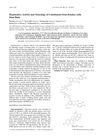 3 citations,
January 2024 in “Materials advances”
3 citations,
January 2024 in “Materials advances” Cellulose nanocrystals are promising for making effective, sustainable sensors for various uses.
83 citations,
August 2020 in “Resources” Macroalgae compounds offer sustainable, effective benefits for cosmetics.
Combining PRP with a special lotion is more effective for hair loss than PRP alone.
 431 citations,
October 2008 in “Current Medicinal Chemistry”
431 citations,
October 2008 in “Current Medicinal Chemistry” Coumarin derivatives show promise as anti-estrogenic agents for treating breast cancer, with some in clinical trials.
 February 2024 in “Biomedicines”
February 2024 in “Biomedicines” Hormones like androgens, estrogen, thyroid hormones, and stress hormones can contribute to hair loss, and treatments target these hormonal imbalances.
 32 citations,
November 1996 in “International Journal of Dermatology”
32 citations,
November 1996 in “International Journal of Dermatology” Antiandrogens can help treat skin conditions like acne and excessive hair in women when used carefully.
 8 citations,
January 1989 in “Annual Reports in Medicinal Chemistry”
8 citations,
January 1989 in “Annual Reports in Medicinal Chemistry” Hair loss from alopecia areata and androgenetic alopecia can be treated, but more effective and safer treatments are needed.
 33 citations,
July 1992 in “Journal of Investigative Dermatology”
33 citations,
July 1992 in “Journal of Investigative Dermatology” Minoxidil doesn't affect perifollicular lymphoid infiltration in alopecia areata patients.
 16 citations,
June 2021 in “Journal of Dermatological Treatment”
16 citations,
June 2021 in “Journal of Dermatological Treatment” Minoxidil effectively treats hair loss, especially androgenetic alopecia, but needs more research for better understanding.
 9 citations,
November 2022 in “Applied sciences”
9 citations,
November 2022 in “Applied sciences” Marine algae compounds may improve skin health and promote hair growth.
 16 citations,
July 2020 in “Advanced functional materials”
16 citations,
July 2020 in “Advanced functional materials” 3D cell-derived matrices improve tissue regeneration and disease modeling.
 75 citations,
February 2016 in “The Journal of Sexual Medicine”
75 citations,
February 2016 in “The Journal of Sexual Medicine” Androgens play a role in female sexual function, and testosterone therapy can help women with low sexual desire, but more research is needed on treatments and long-term safety.

Tiny particles called extracellular vesicles show potential for improving skin health in cosmetics, but more research is needed to confirm their safety and effectiveness.
 8 citations,
March 2022 in “Journal of The Taiwan Institute of Chemical Engineers”
8 citations,
March 2022 in “Journal of The Taiwan Institute of Chemical Engineers” Extracts from a type of brown seaweed can help promote hair growth.
22 citations,
January 2017 in “Journal of steroid biochemistry and molecular biology/The Journal of steroid biochemistry and molecular biology” A new method accurately measures nine specific hormones in human blood.
5 citations,
August 2016 in “International Journal of Cosmetic Science” Shampoo coacervates can cause scalp irritation due to released surfactants.
 7 citations,
January 2007 in “Elsevier eBooks”
7 citations,
January 2007 in “Elsevier eBooks” Shampoos clean hair mainly with surfactants and have added ingredients for extra benefits.
 October 2023 in “International journal of research in dermatology”
October 2023 in “International journal of research in dermatology” Mintop shampoo improved hair smoothness, shine, and strength after ten washes.
 1 citations,
October 2021 in “Indian Journal of Plastic Surgery/Indian journal of plastic surgery”
1 citations,
October 2021 in “Indian Journal of Plastic Surgery/Indian journal of plastic surgery” Proper hair care and safe use of hair products are crucial for those with hair loss.
 December 2023 in “Journal of Trace Elements in Medicine and Biology”
December 2023 in “Journal of Trace Elements in Medicine and Biology” Molybdenum nanoparticles could be a new treatment for hair loss, working differently than minoxidil.
 5 citations,
January 1987 in “Gynecologic and obstetric investigation”
5 citations,
January 1987 in “Gynecologic and obstetric investigation” Cyproterone acetate implants were more effective at reducing facial hair and improving skin in severe hirsutism than oral treatment.
 74 citations,
March 2001 in “Seminars in Cutaneous Medicine and Surgery”
74 citations,
March 2001 in “Seminars in Cutaneous Medicine and Surgery” The document concludes that skin biopsies, genetic and environmental factors, and specific treatments are important in managing cutaneous lupus erythematosus.
 9 citations,
December 2006 in “Annals of the New York Academy of Sciences”
9 citations,
December 2006 in “Annals of the New York Academy of Sciences” Minoxidil helps hair growth by increasing blood flow and stimulating hair follicles.
 58 citations,
January 2003 in “Biological & Pharmaceutical Bulletin”
58 citations,
January 2003 in “Biological & Pharmaceutical Bulletin” Bombax ceiba stem bark extracts can lower blood pressure, but high doses can be toxic and lethal.

Most men seeking hair transplants have Male Pattern Baldness, influenced by genetics, age, and testosterone, while women's hair loss can be affected by thyroid function, iron, testosterone, prolactin, ferritin levels, and certain conditions. Follicular Unit Extraction is a popular hair transplant technique.
31 citations,
January 2008 in “Gynecological endocrinology” Both birth control pills improved hormone levels and skin conditions in women with hyperandrogenism, but the one with drospirenone was more effective.
 April 2023 in “Research Square (Research Square)”
April 2023 in “Research Square (Research Square)” A 24-year-old woman had a rare ovarian tumor that caused male-pattern hair growth and was hard to diagnose and treat.
3 citations,
January 2011 in “International journal of trichology” Low DHEA-S levels might be linked to alopecia areata and could be a potential treatment target.
 28 citations,
April 2014 in “Hormones”
28 citations,
April 2014 in “Hormones” Higher androstenedione levels in women with PCOS are linked to more severe symptoms.
 30 citations,
June 2006 in “British journal of dermatology/British journal of dermatology, Supplement”
30 citations,
June 2006 in “British journal of dermatology/British journal of dermatology, Supplement” Oral zinc sulphate reduces dark hair color in mice.
























